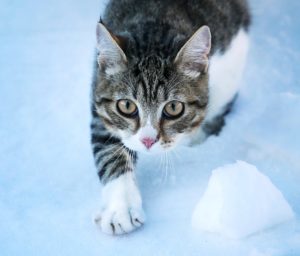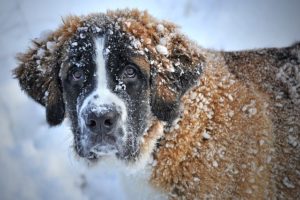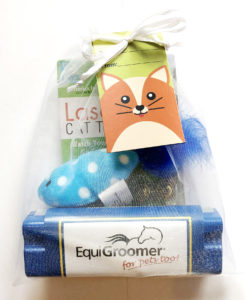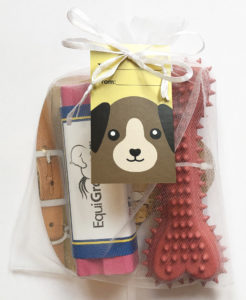
Winter is approaching which means fewer daylight hours, colder temperatures and stormy weather.
Are you ready to protect your pets from the challenges of winter?
Every pet depends upon their owners to ensure their health, safety and wellness, especially during the winter!
Winter Poses Unique Challenges for Pet Wellness
 By educating ourselves about the unique challenges of winter, including wet, stormy and freezing weather, pet owners can effectively keep their pet comfortable and safe while also preventing illness – or worse – for their beloved animal companion.
By educating ourselves about the unique challenges of winter, including wet, stormy and freezing weather, pet owners can effectively keep their pet comfortable and safe while also preventing illness – or worse – for their beloved animal companion.
“It’s important to remember that, despite their fur coats, pets can suffer from the cold just like we do. So, it’s up to us to make sure we provide the extra care they need during colder weather.”
Nina Downing, Vet Nurse of the UK’s People’s Dispensary for Sick Animals (or PDSA)
Unfortunately, our pets cannot vocalize how they are feeling, whether they are sick or even suffering (and most pets will try to hide sickness or pain). Keep reading about how to best prevent your canine friend from the dangers of winter!
(Our next blog post, at the end of November, will cover protecting both felines and equines.)
The Rules of Winter: Dogs
Despite the appearance of an impressive winter coat on many dogs, they still get wet and chilled. All dogs should always have access to inside shelter for warmth, safety, well-being and protection.
shelter for warmth, safety, well-being and protection.
- NEVER Leave Dogs …
In cars, in the back of pickups or anywhere that is unheated in order to protect them from dangerous hypothermia.
- Use Coats & Boots
Is your dog very young or old? Are they sick? Or do they have a very thin coat of hair?
-
- A well-fitted, waterproof coat can help protect dogs who are vulnerable.
- Properly fitted dog boots can also be helpful in protecting tender paws.
- Maintain Regular Brushing
Maintain your dog’s regular brushing to help stimulate and distribute natural oils to combat your pet’s dry and itchy skin from winter’s cold and dry air.
- Limit Time Outside
Dogs will still need daily walks but never keep them outside for long periods of time. Even the hardiest canine who loves the snow can suffer negative effects from extended exposure to snow, ice and plummeting temperatures. It’s better to go out more often for shorter lengths of time. If your dog begins regularly lifting his paw(s), it’s time to go inside, warm up and check his paws.
suffer negative effects from extended exposure to snow, ice and plummeting temperatures. It’s better to go out more often for shorter lengths of time. If your dog begins regularly lifting his paw(s), it’s time to go inside, warm up and check his paws.
- After Being Outside
After coming inside, immediately:
-
- Towel-dry a wet dog (or cat).
- If they have longer hair, use a blow-dryer (on a LOW setting at a comfortable distance) to get them completely dry.
- Carefully check their paws (especially between the toes) and remove any:
- Frozen snow/ice
- Commercial ice melt products
- Salt
- Grit or dirt
These can cause unwanted friction and subsequent pain for your dog. You also do not want your dog licking/ingesting any of the causticitems.
-
- Gently massage paws (and between the toes) with a pet-friendly and food-grade wax or balm to heal – and protect – cracked pads and irritated skin. (You can also use this in hot weather.) Use on cracked noses for additional protection too!

Want to make your own Paw Wax with healthy and safe ingredients?
Watch the DIY video from Rodney Habib here
~ OR ~
Use the homemade Paw Balm recipe for dogs from Christina Walker
on her Everyday Dog Mom blog!
REMINDER: Come back for our next blog post, at the end of November,
to learn the best winter tips for protecting both cats and horses.
Remember regular grooming is important even during winter months!
Winter’s cold and dry air can lead to dry and itchy skin for your pet. Regular grooming helps stimulate and distribute natural oils in their skin.
The EquiGroomer offers easy brushing with NO pulling, discomfort or damage to your pet’s topcoat or skin.
The EquiGroomer gift bag is the perfect holiday gift for the pets and pet lovers in your life!
(Just click on an image to order – cat or dog.)
For individual or bulk orders, call 860-573-0604 or click here to send us an email.
Additional Reading:
Keeping Pets Safe and Healthy Over Winter
Keep Your Furry Friends Safe with These 9 Winter Pet Safety Tips
12 Coziest Dog Coats for Winter
Caring for Your Horse in the Winter
Image Credits:
Image by Christo Anestev from Pixabay
Image by Manfred Richter from Pixabay
Product Images are Courtesy of EquiGroomer





 Each stage of your pet’s life has its own requirements for well-being. The needs of a puppy, kitten or foal will be different from an adult or senior. So, it’s important to focus on the specific wellness needs and effective preventative care for their age, breed, health history and potential aging challenges.
Each stage of your pet’s life has its own requirements for well-being. The needs of a puppy, kitten or foal will be different from an adult or senior. So, it’s important to focus on the specific wellness needs and effective preventative care for their age, breed, health history and potential aging challenges.




